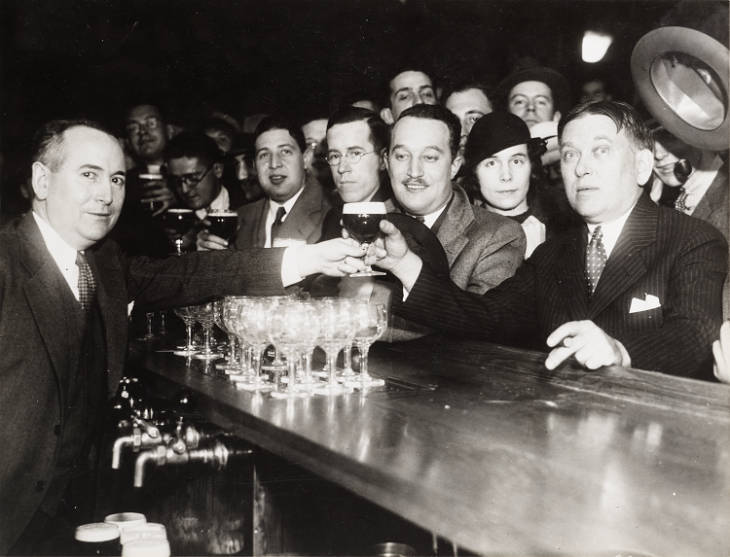In the year 1904, when the Herald office was destroyed in the great Baltimore fire and we had to print the paper for five weeks in Philadelphia, I was sent ahead to look for accommodations for the printers. I found them in one of those old-fashioned dollar-a-day hotels that were all bar on the first floor. The proprietor, a German with goat whiskers, was somewhat reluctant to come to terms, for he had heard that printers were wild fellows who might be expected to break up his furniture and rough his chambermaids, but when I told him that a beer champion was among them he showed a friendly interest, and when I began to brag about Bill’s extraordinary talents he proposed amiably that some Philadelphia foam jumpers be invited in to make it a race.The first heat was run the very next night, and Bill won hands down. In fact, he won so easily that he offered grandly to go on until he had drunk twice as much as the next-best entry. We restrained him and got him to bed, for there had been some ominous whispering among the other starters and it was plain that they were planning to call in help.The next night it appeared in the shape of a tall, thin man from Allentown, Pennsylvania, who was introduced as the champion of the Lehigh Valley. He claimed to be not only a beer-drinker of high gifts but also a member of the Bach Choir at Bethlehem, and when he got down his first dozen mugs—the boys were drinking from the wood—he cut loose with an exultant yodel that he said was one of Bach’s forgotten minor works. But he might very well have saved his wind, for Bill soon had him, and at the end of the setting he was four or five mugs behind and in a state resembling suffocation. The next afternoon I saw his fans taking him home, a sadder and a much less melodious man.On the first two nights there were only slim galleries, but on the third the bar was jammed, and anyone could see that something desperate was afoot. It turned out to be the introduction of two super-champions, the one a short, saturnine Welshman from Wilkes-Barre and the other a hearty, blond young fellow from one of the Philadelphia suburbs, who said that he was half German and half Irish. The Welshman was presented as the man who had twice drunk Otto the Brewery Horse under the table, and we were supposed to know who Otto was, though we didn’t. The Celto-Teutonic mongrel had a committee with him, and the chairman thereof offered to lay twenty-five dollars on him at even money. The printers in Bill’s corner made up the money at once, and it had grown to fifty dollars in forty minutes by the clock, for the hybrid took only that long to blow up. The Welshman lasted much better, and there were some uneasy moments when he seemed destined to make history again by adding Bill to Otto, but in the end he succumbed so suddenly that it seemed like a bang, and his friends laid him out on the floor and began fanning him with bar towels.
Bill was very cocky after that and talked grandiosely of taking on two champions at a time, in a marathon series. There were no takers for several nights, but then they began to filter in from the remotest wilds of the Pennsylvania-Dutch country, and the whole Herald staff was kept busy guarding Bill by day, to make sure that he did not waste any energy on malt liquor in the afternoons. He knocked off twenty or thirty challengers during the ensuing month, including another alleged member of the Bach Choir, two more Welshmen from the hard-coal country, a Scotsman with an ear missing, and a bearded Dunkard from Lancaster County. They were mainly pushovers, but now and then there was a tough one. Bill did not let this heavy going interfere with the practice of his profession. He set type every night from 6 p.m. to midnight in the office of the Evening Telegraph, where we were printing the Herald, and never began his combats until twelve-thirty. By two o’clock he was commonly in bed, with another wreath of laurels hanging on the gas jet.
To ease your suspense, I’ll tell you at once that he was never beaten. Germans, Irishmen, Welshmen, and Scotsmen went down before him like so many Sunday-school superintendents, and he bowled over everyday Americans with such facility that only two of them ever lasted more than half an hour. But I should in candor add that he was out of service during the last week of our stay in Philadelphia. What fetched him is still a bone of contention among the pathologists at the Johns Hopkins Medical School, to whom the facts were presented officially on our return to our rehabilitated printing plant in Baltimore ...













































































































































































No comments:
Post a Comment